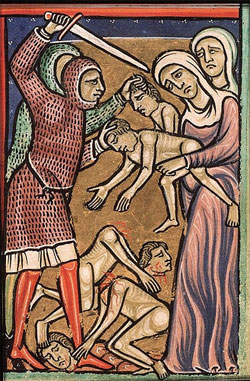Our house went on the market a couple of weeks ago and almost as soon as I posted a notice on Facebook about it, I began receiving advice about selling. Well... sort of advice. People of various sorts began telling me to bury St. Joseph in my front yard to help speed the sale of our house. Some simply said to bury him, but others said that Joseph's orientation mattered. Feet toward the house and head toward the street, or the other way around... I don't remember.
The stress of selling a house in a slow economy is somewhat hard to bear, especially when we need this house to sell before we can solidify a bid on a new house. To say my wife and I are anxious is an understatement. With this stress upon us, such house selling advice is tempting. Anything that promises a quick sell without lowering the price has to be good right? We have lost out on one house bid because someone else made another offer that was accepted knocking our contingent offer out from under us. We have another similar offer on another house. Knowing that you need to move but cannot until you sell your house can lead to sleepless nights.
To be honest though, as an aside, the other voices that rise up when something falls through are equally anxiety-invoking. The voices that say "Well it just wasn't meant to be..." as if God has just one perfect house in mind for me and my family and all the others are just pointless. I know they are trying to make me feel better, but just like I am certain that people do not have just one person they are meant to marry, there is not just one house that God wills me to have. This notion that is rather popular with many Christian voices wants to maintain the supremacy of God's will, but I think it misses the point. God wills many things, but what house I buy is not on that list I think. God certainly wants me to be a good steward of the things that are given to me and my family. But there is an inherent freedom in that mix. My faith will indeed help my wife and I decide which house to choose, but if the offer falls through, my faith was not likely insufficient, nor was it necessarily God putting the kibosh on the deal. There will be a place for my family and I to dwell in peace and safety. That I trust.
Now back to the original point, which is still connected to the one I trust. Burying a statue of St. Joseph in the yard, seems to be exactly the sort of thing Luther and the reformers railed against with the cult of the saints. I have a very high view of saints. I routinely commemorate saints, both biblical and extra-biblical, for the particular witness their lives have provided for living out one's faith in Christ. I have routinely responded to the advice on burying St.. Joseph with the phrase, "I have the witness of scripture and the confessions behind me. I will simply trust Jesus." And of course I get puzzled looks. But in the twenty-first article of the Augsburg Confessions, the one dealing with the cult of saints, it reads quite appropriately:
However, it cannot be proved from the Scriptures that we are to invoke saints or seek help from them. "For there is one mediator between God and humans, Christ Jesus" (1 Tim. 2:5), who is the only savior, the only high priest, advocate and intercessor before God (Rom. 8:34). He alone has promised to hear our prayers.
It is hard enough selling a house. I don't need to wrestle with this stuff as well. I trust that God will provide a place for us to live. I have to. If not I would obsess and fret and worry. I will simply let God do whatever God is going to do. God will provide. I don't need to use any saint, even one as important as St. Joseph. So I will save the time, money, and effort of burying Joseph.
But just to make sure... check with me in a couple of weeks.
Or if you know someone who is looking for a charming house in a nice neighborhood of Morgantown, WV...
 Dec. 28... the fourth day of Christmas is not a day many preachers want to fall on a Sunday so they can avoid preaching on the Slaughter of the Innocents, the tale from Matthew that tells of Herod's slaughter of all children two and under in the hopes that he destroys Jesus.
Dec. 28... the fourth day of Christmas is not a day many preachers want to fall on a Sunday so they can avoid preaching on the Slaughter of the Innocents, the tale from Matthew that tells of Herod's slaughter of all children two and under in the hopes that he destroys Jesus.
